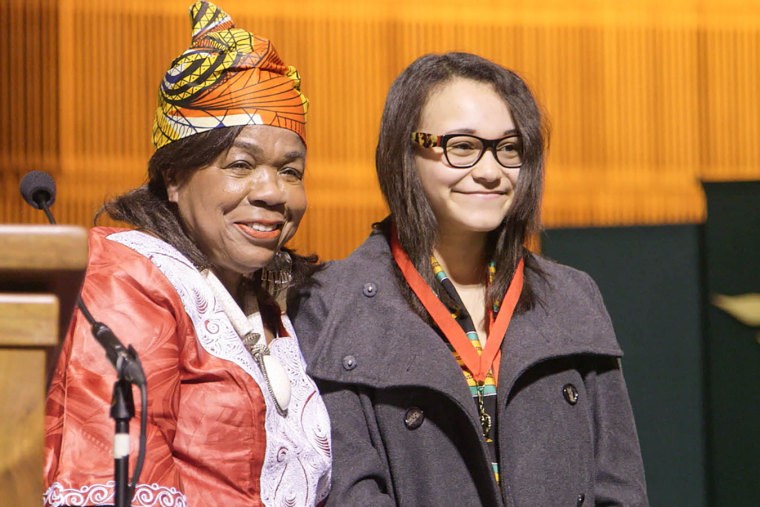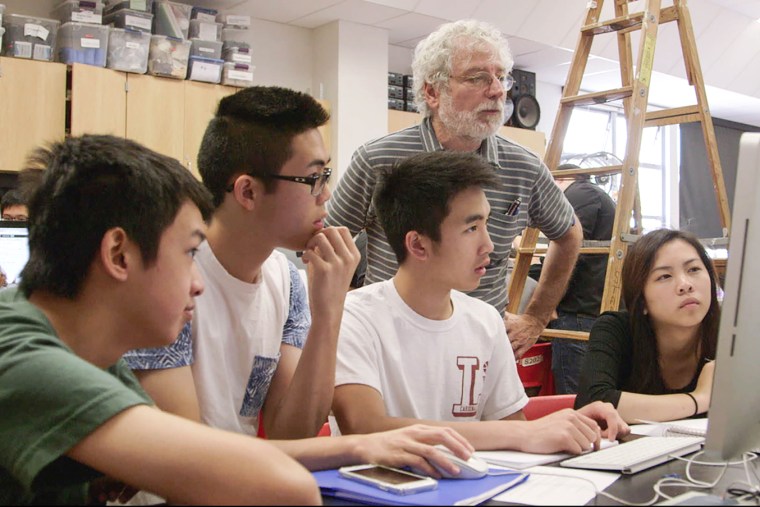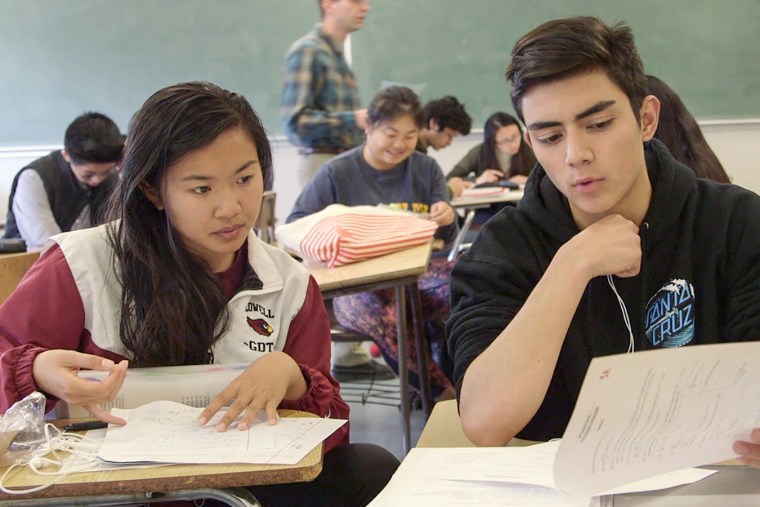Film aims to humanize working-class Asian Americans with elite college dreams
[ad_1]
In a documentary on San Francisco’s demanding Lowell Substantial University, an Asian American scholar chastises his mother for saying that his father under no circumstances completed higher college.
“Don’t say that,” then-senior Alvan Cai says in Mandarin to his mom, Capri, off-digicam in advance of speaking to the filmmakers. “I really don’t want folks to imagine lowly of my father or anything.”
Even though Asian Us residents who strive for best-tier faculties are stereotyped as currently being from rich, educated households, the actuality more usually resembles tales like Cai’s: little ones of functioning-class immigrants who grab on to the idea of higher schooling as a car for security in the U.S.
It is these students whom director Debbie Lum reported she hoped to humanize in her documentary, “Try More durable!,” which made its broadcast debut Monday on PBS’s Independent Lens.
“These are the youngsters who simply cannot manage to go to personal school. People bank on that,” Lum instructed NBC Asian The usa. “It is a way for someone who did not have obtain to have a way up in society.”

Educators and co-chair of San Francisco African American Honor Roll, with honor student
Rachael Schmidt in a scene from “Test Harder!”Courtesy Greenwich Leisure
The documentary, which premiered at Sundance final calendar year, chronicles the lives of five college students through the 2016-17 college year as they embark on a grueling college admissions system.
For seniors across the country, the admissions journey could color a part of their higher university experience. But for those at Lowell, the city’s prime general public college, the documentary shows how the system nearly single-handedly defines students’ coming-of-age, thrusting them into the ebbs and flows of anticipation and heartbreak.
The college students are observed shouldering the load of extracurriculars ranging from college student authorities to science competitions to sporting activities, together with several sophisticated placement lessons, and do the job. On prime of it all, lots of say they are in consistent negotiation concerning their individual desires and people of their mom and dad. Lum mentioned that with its demanding surroundings, Lowell is generally described as “elite.” But the expression will come with socioeconomic baggage that doesn’t quite properly replicate Lowell learners.
“For the most element, and historically talking, it’s the children who are coming from Chinatown, having an hour bus ride to get there,” Lum explained. “Maybe they are residing in Chinatown SRO [single-room occupancy] housing.”

In accordance to the most current Lowell Higher Faculty Accountability Report Card, unveiled by the San Francisco Unified University District, the university student inhabitants is overwhelmingly made up of folks of shade, with Asian Individuals constituting a lot more than 50 percent. Far more than a third of the pupil human body is thought of “socioeconomically deprived.” And more than a quarter qualify for totally free lunch.
Lum explained it was apparent that quite a few of the parents, who’re mainly Asian immigrants, performed no smaller part in their children’s education, prodding them towards certain endeavors and carting them about to following-college things to do.
But a lot of their involvement, Lum claimed, appeared to be driven by a perception in the American Aspiration and a believe in in meritocracy. The mentality isn’t unique to Lowell, possibly, but a person which is frequently misinterpreted and labeled as a symptom of overbearing “tiger parenting.”
Pawan Dhingra, a sociologist and a professor of American scientific tests at Amherst Higher education, formerly discussed that the yearning to attend elite universities is rooted in the perception that schooling is the only way for Asian American kids to contend with some others, specially whites. The the vast majority of Asian Us residents arrive from immigrant family members and do not have current social connections to assist safe work or internships.
Lum claimed these household values spawn a exceptional lifestyle amid students, who are certain by a shared comprehension that their determination alone could likely elevate them, and their people, up into much better instances.
“There is the kind of neighborhood exactly where they’re all in it with each other and no one has a special go,” Lum said. “There aren’t students who, their mother and father are sitting down on the board of anything or other.”

The director explained that this environment resulted in a social hierarchy that very values academic accomplishment and expertise, aspects core to admissions. Social life, as opposed to several other schools, does not orbit close to the jocks. Jonathan Chu, for instance, is found as a “Lowell God.” in the film. He excels in his AP classes, masters the violin and quite a few athletics, and serves as university student entire body president.
Lum claimed she acquired in filming that Chu was also an remarkable piano participant and rumored to ice skate as perfectly. These in the movie just about lionize him, speaking about Chu as if he were being a legendary icon, for whom they have terrific admiration. And of course, he’s been accepted to Harvard.
The emphasis on excellence is so pervasive in their social circles, Lum claimed, that a person student, Ian Wang, utilized far more strain on himself regardless of active encouragement from his dad and mom, who are Lowell alums, to take a fewer intense training course load.
“Ian made use of to get so much flak, since he only took two AP lessons in his junior 12 months,” Lum remembers. “We had already witnessed the youngsters offering him a actually difficult time about what his mom felt genuinely undesirable about … she was like, ‘I don’t want you to destroy yourself.’”
As admission to elite universities occupy the heart of life at Lowell, affirmative action remains a topic that lurks beneath the area. In a person scene, a physics trainer warns pupils that they could not get into their aspiration Ivy League college, even if they’ve acquired a place
, mainly because his powerpoint slide reads, “You’re Asian!” And in many others, Rachel Schmidt, a Black pupil, reveals some of the assumptions and casual racism directed at her simply because of her race.
“Throughout my time at Lowell, I have internalized that stereotype that I get a lot of items mainly because I’m Black. And I think for a though, I’ve experimented with to not possess up to my blackness,” she admits. “I feel I’ve labored challenging and I imagine I have the proper grades.”
Lum stated that the perception that the cards are stacked in opposition to Asian students looms massive. Even Schmidt instructed the filmmakers that she doesn’t feel it’s good that her Asian peers are not getting into school, just because of their race. Even so, Lum mentioned that a vast majority of the Asian learners carry on to guidance affirmative motion.
“Our community has been pitted versus other minority communities in this odd way, which is not true,” Lum stated. “Most of the young children that I talked to were in aid of affirmative action. Even if they imagined, ‘Yeah, that may imply it will make it harder for me. but for persons who have expert systemic oppression, There ought to be some righting of the wrongs.’”
[ad_2]
Supply website link







